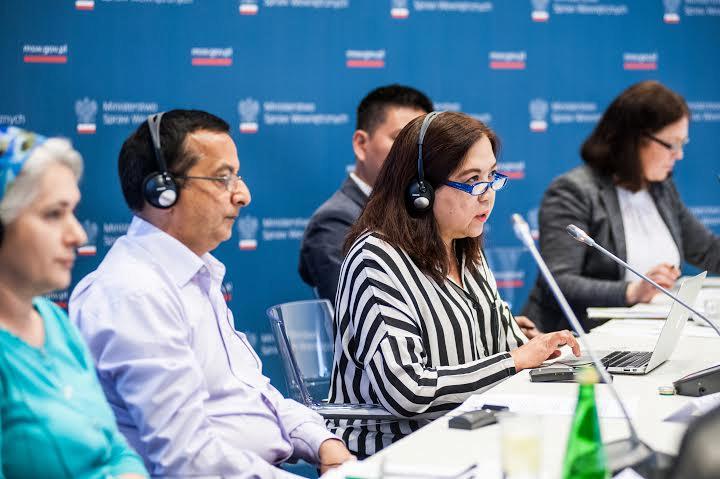
Ambassador Patricia Ann V. Paez during the panel discussion on the IOM’s Assisted Voluntary Return and Reintegration (AVRR) program; on the extreme right is Ms. Joanna Sosnowksa of the IOM-Poland
Philippine envoy to Poland Ambassador Patricia Ann V. Paez recently participated in a panel discussion sponsored by the International Organization for Migration (IOM)-Poland on how to reach irregular or undocumented migrants and provide them with information about the IOM’s assisted voluntary and reintegration program.
In her brief remarks, Amb. Paez said that a challenge for the Philippine Embassy is how to identify and ascertain the whereaabouts of irregular or undocumented Filipino migrants since many of the latter do not want to surface for fear of being turned over to proper authorities and subsequently, to be deported.
Amb. Paez added that some Filipino irregular migrantswho want to go back to the Philippines could not go home immediately because they need to raise a sufficient amount of money to pay back their debtors who provided them with money to pay their recruiters. This debt amounts to at least US$ 4,000 to US$ 5,000. The envoy stressed the need to gain these irregular migrants’ trust and confidence, adding that fortunately, there are some individuals from the Filipino community who, over the years, have been helping these irregular migrants. Usually, it is these individuals who inform the Embassy about irregular migrants needing assisted voluntary return under the IOM’s program.
To provide accurate information about the AVRR, she said that the embassy has uploaded the link of the IOM on its website and Facebook account. However, Amb. Paez stressed that in Filipino culture, use of the social media could not be a susbtitute for human interaction. She emphasized that to better reach out to Filipino compatriots, the Philippine Embassy has been tapping into the Filipinos’ cherished values, social mores and customs.These are the Filipino values of being “God-fearing” (“maka-Diyos”), being humane (“makatao”), and the value of showing empathy (“pakikisama”).
She added that to increase awareness about the AVRR and to filter information about it as well as about other issues of concern to the Filipino community, the embassy periodically holds a “pulong bayan” or a “town-hall meeting” with the Filipinos in Poland. This is usually followed by a “salo-salo” or “eating together” which is a social custom and a form of bonding to strengthen social cohesiveness among the Filipinos in Poland. On such occassions, the Filipinos keep each other posted about their work situations and personal lives and get to learn about the plight of those needing help. She mentioned that in August 2013, the embassy held a “pulong bayan” on the labor rights of migrants, on the New Act for Foreigners, and on human trafficking.
Amb. Paez said that one of the three pillars of Philippine foreign policy is to assist Filipino nationals in distress. Based on the records of the IOM-Poland, a total of 12 Filipinos have been repatriated through the AVRR program. There are several successful reintegration stories. With the IOM’s funding assistance, the repatriated Filipinos were able to engage in small businesses such as putting up stores and engaging in the business of rice trading.
Amb. Paez commended the IOM’s AVRR program as a “win-win” humanitarian endeavor, both for the host countries and for the irregular migrants, and for giving thousands of people their “second chances” to lead lives with dignity in their own homelands.
Amb. Paez expressed her appreciation to various institutions which have patnered and cooperated with the Philippine Embassy in Warsaw in protecting and in promoting the rights and welfare of Filipino workers in Poland, namely the: IOM-Poland; the Ministry of Interior, the National Labor Inspectorate. the Office of the Border Guard, the Office for Foreigners, the La Stada Foundation and other non-government organizations.

